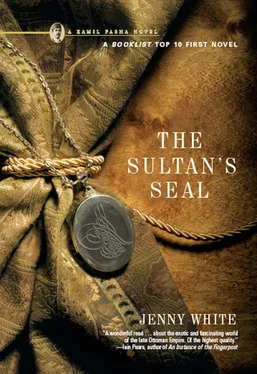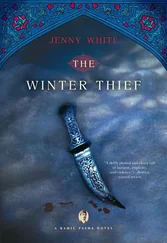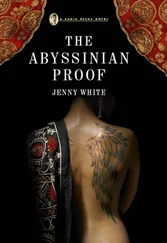Jenny White - The Sultan's seal
Здесь есть возможность читать онлайн «Jenny White - The Sultan's seal» весь текст электронной книги совершенно бесплатно (целиком полную версию без сокращений). В некоторых случаях можно слушать аудио, скачать через торрент в формате fb2 и присутствует краткое содержание. Жанр: Исторический детектив, на английском языке. Описание произведения, (предисловие) а так же отзывы посетителей доступны на портале библиотеки ЛибКат.
- Название:The Sultan's seal
- Автор:
- Жанр:
- Год:неизвестен
- ISBN:нет данных
- Рейтинг книги:5 / 5. Голосов: 1
-
Избранное:Добавить в избранное
- Отзывы:
-
Ваша оценка:
- 100
- 1
- 2
- 3
- 4
- 5
The Sultan's seal: краткое содержание, описание и аннотация
Предлагаем к чтению аннотацию, описание, краткое содержание или предисловие (зависит от того, что написал сам автор книги «The Sultan's seal»). Если вы не нашли необходимую информацию о книге — напишите в комментариях, мы постараемся отыскать её.
The Sultan's seal — читать онлайн бесплатно полную книгу (весь текст) целиком
Ниже представлен текст книги, разбитый по страницам. Система сохранения места последней прочитанной страницы, позволяет с удобством читать онлайн бесплатно книгу «The Sultan's seal», без необходимости каждый раз заново искать на чём Вы остановились. Поставьте закладку, и сможете в любой момент перейти на страницу, на которой закончили чтение.
Интервал:
Закладка:
“Ah, yes, I’ve heard of it,” Kamil muses. “It’s built on a jetty over the water so people can swim in private.”
“More like wading in a cage rather than swimming. The Emirgan one is for women.”
“I misjudged our women’s progressiveness. What made you think of the sea hamam, of all things?”
“It’s a perfect place to meet if you want complete privacy. It’s closed at night, but it wouldn’t be hard to get in. In fact, it probably hasn’t been used since last year. It usually doesn’t open until midsummer. Other than a few villas and fishing settlements, there aren’t a lot of other possibilities. No one in the villas claims to remember an Englishwoman.”
Michel opens the door to the judicial antechamber, letting in a din of voices. He and Kamil push through the tide of plaintiffs, petitioners, clerks, and their assistants and emerge from the squat stone courthouse onto the busy Grande Rue de Pera. A horse-drawn tram clangs along the boulevard, carrying matrons from the new northern suburbs into town for shopping. As they wait for their driver to bring the carriage, Kamil surveys the early morning bustle of Istanbul’s most modern quarter. Apprentices balance nested copper tins of hot food and trays of steaming tea, hurrying toward customers waiting in shops and hotels. Carts rattle as vendors pull their wares along the cobbled street. Advertisements for their services, or for mulberries, green plums, carpets, or scrap metal, issue from practiced throats. Shop windows display the latest products.
This tumult, Kamil knows, is surrounded by the tranquillity of old Constantinople, the name many residents still use for their city, its Byzantine roots as capital of the eastern Roman Empire still everywhere in evidence. At one end of Pera is a pleasant cemetery beneath a vast canopy of cypresses where people stroll and picnic on the raised tombs. Embassies set in lush gardens line the boulevard. To the west, Pera overlooks the waters of the Golden Horn, which takes its name from the reflected fires of the setting sun. To the east, the land falls off precipitously to reveal the Bosphorus and the wide triangle of water where the strait and inlet merge to push into the Sea of Marmara. Cascading down the hillsides are canyons of stone apartment buildings and old wooden houses strung together by alleys meandering around the remains of Byzantine and Genoese walls, towers, and archways. Where the inclines are too steep, roads become wide stairways.
Kamil and Michel head north in an open phaeton, bundled against the wind. It is a long, dusty trip winding through the hills above the Bosphorus, but their driver knows the road well and keeps a steady pace. Kamil’s eyes graze the edge of the forest as they pass, alert for telltale colors and shapes of flowering plants, challenging himself to remember their botanical names. His fingers worry the warm amber in his pocket.
If he fails to solve this case, he will have the unpleasant task of reporting his failure to Minister of Justice Nizam Pasha. On the first Thursday of every month, Kamil must stand, hands folded before him, eyes lowered, in the drafty reception hall and wait for permission to speak. Nizam Pasha, seated cross-legged on a raised divan, listens in grim silence, regarding him with flat, unreadable eyes. When Kamil has finished, Nizam Pasha whispers to his subordinate, then dismisses Kamil with a careless wave of his fingers and a moue of the mouth, as if he has tasted something foul.
Only once has the minister spoken directly to Kamil, this during his first audience.
“Do not presume here on the cloak of your ancestors. You are naked in the sight of the padishah. Do not disappoint him.”
Nizam Pasha reports directly to the sultan, but his is only one vein among many pumping information into the heart of the empire. The secret police are the insomniac sultan’s eyes, watching, suspicious, invisible to all but a few in the palace. They spy on the police and the judges, as they do on all the other servants of the state.
Kamil reflects that his position as pasha and son of a pasha affords little protection from the secret police, who will punish not only those who displease them, but their entire families. The images of his unhappy but determined sister Feride and her young daughters flashes though his mind. And his silent father, captive to an inner world populated only by his dead wife. Kamil knows he must steer a delicate path between politically astute silence and the demands posed by proper judicial procedure and scientific investigation. This was never more important than in these uncertain days.
While the sultan wraps himself ever more closely in the cloak of religion by catering to the powerful sheikhs and leaders of Islamic brotherhoods, it is rumored that even among the sultan’s inner circle there are those who would like to see a representative government and an Islam compatible with modern notions of progress and reason. These are the men who pushed through the new legal system that has effectively taken away the power of religiously trained kadi judges and given it to magistrates, young men like Kamil with secular training and a preference for science and logic. In the new courts, magistrates argue cases before a state judge and supervise investigations. The formerly all-powerful kadis are restricted to handling local divorces and inheritance disputes, although a kadi still has a place on the bench in the Majlis-i Tahkikat, the Court of Inquiry, the highest court in the province of Istanbul. It is not surprising, Kamil thinks, that men like Nizam Pasha, whose education has been in religious medreses and who speak no European languages, should feel threatened by the magistrates under their jurisdiction.
He glances fondly at his companion in the phaeton. Michel has been his ally in puzzling through the logical complexities of many cases. His mood lifts as he remembers the pleasant hours spent listening to Ladino songs and Italian cantos in tiny clubs hidden in the alleys of Galata, Michel as his guide to the richly textured but insular world of the Jewish community. Jews and Christians had been the merchants, bankers, surgeons, and artists, the beating international heart of the empire for hundreds of years. Their presence here predates that of the Ottomans. Jewish migrants and refugees not only were gladly sheltered, but sought after by the sultans, who valued their education and acumen. The Sephardic Jews expelled in 1492 by Queen Isabella and King Ferdinand of Spain were invited by Sultan Bayezid II to settle in the empire under his protection, with the following comment: “How can one call this king wise and sensible, when he beggars his own country and enriches mine?” Their descendants in Istanbul, like Michel, still speak Ladino, the Spanish of the expulsion.
On their free afternoons, Kamil and Michel meet in the café where they had become reacquainted, discussing the latest medical advances and scientific techniques in the books and journals with which the book dealers in the courtyard behind the Grand Bazaar keep them well supplied. Sadly, the young surgeon does not share his interest in botany, but is more interested in the volatile properties of plants, the secrets they are forced to release under duress.
After a while, Kamil leans his head against the padded leather headrest and allows himself to drift. He finds himself dwelling on a memory of Sybil lifting the bundle of the dead woman’s jewelry from her lap. Her hands were plump and dimpled as a baby’s. The tender feeling evoked by the memory surprises him. Then he realizes, they are his mother’s hands.
AMID A RACKET of gulls, they make their way along the creaking jetty to the small square structure at its end. The Bosphorus here has thrown up a long scallop of rough brown sand and rocks. The sea hamam is built on stilts over shallow water, reached by a long pier. Its bleached boards are bearded with sea moss. The door is latched but not locked. There would be nothing inside to protect. Kamil opens the door and enters a windowless room. There is a musty smell of swollen wood and unwashed laundry. The Bosphorus has no odor. It is too swift. It tears the briny air with it like a flag in a gale. But there is a sense of the sea inside the dark room, a feeling of motion, as if the room is tilting.
Читать дальшеИнтервал:
Закладка:
Похожие книги на «The Sultan's seal»
Представляем Вашему вниманию похожие книги на «The Sultan's seal» списком для выбора. Мы отобрали схожую по названию и смыслу литературу в надежде предоставить читателям больше вариантов отыскать новые, интересные, ещё непрочитанные произведения.
Обсуждение, отзывы о книге «The Sultan's seal» и просто собственные мнения читателей. Оставьте ваши комментарии, напишите, что Вы думаете о произведении, его смысле или главных героях. Укажите что конкретно понравилось, а что нет, и почему Вы так считаете.












